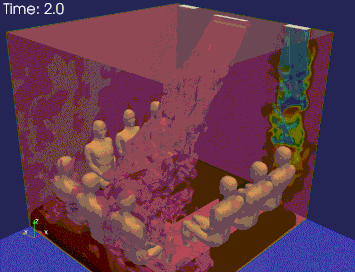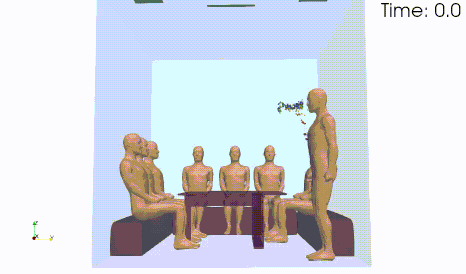Simulation of the propagation of covid
Home » Laboratories » Simulation of the propagation of covid
EOLIOS checks, validates and optimizes your air diffusion systems:
- Multidisciplinary team Pulmonologist / Aeraulician
- Installation of filtration systems
- Audit according to the labor code
- Help with the implementation of the COVID protocol
- Study of the risks of virus propagation
- Air movement modeling
Continue navigation :
Our latest news :
Our projects :
Our areas of expertise :
Simulation for understanding
Various physical phenomena such as the movement of fluids, the movement and deformation of structures, the heat transport of substances, chemical reactions such as combustion phenomena and the propagation of sound are very familiar phenomena in our daily life. These phenomena often occur by affecting each other and constitute extremely complex problems. Therefore, it is academic and industrial to use simulations to elucidate the mechanism and study the performance of the product.
We develop not only conventional fluid simulations, but also numerical analysis methods to simulate complex physical phenomena for sensitive environments, and we publish our results academically.
Theoretical simulation of the propagation of COVID and other viruses
Droplet infection is one of the routes of transmission of infectious diseases caused by viruses such as coronavirus (COVID-19). As it is not possible to visually observe the spread of virus droplets, carriers can spread bacteria to those around them, so appropriate measures are necessary. In addition, aerosols with a particle size of 5 μm or less will float in the air over a longer distance and for a longer period of time, so it is necessary to take measurements separately from large particle size droplets.
In order to take action against droplet infection, it is necessary to correctly predict the process of droplet and aerosol diffusion and to estimate the effect of airflow on infection. In our lab, we conduct simulations using computational fluid dynamics for droplets and aerosols.
In addition to analyzing the simulation results, we are also considering measures to reduce the risk of droplet infection in the light of the results.
We audit the Covid protocols of major groups in order to assess the solutions implemented and evaluate the risks of contamination. We study existing air handling systems, based on their filtration levels, actual air flow rates and their regulation in accordance with the French Labour Code and aerosol propagation phenomena.
Site audit
We conduct site audits to verify the compliance of work spaces and with the objective ofimproving the comfort of employees.



